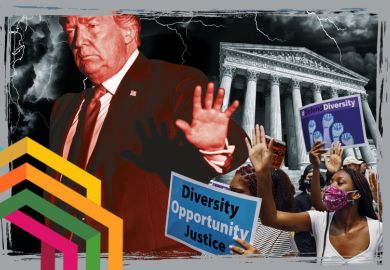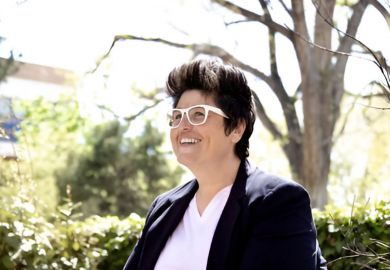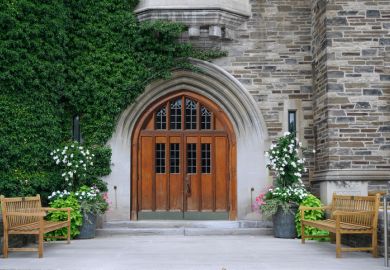The gap between the degree results achieved by various minority groups in the UK and the US and those of the student body as a whole is marked and persistent. Yet lesbian, gay and bisexual (LGB) students are more likely to be awarded a first or upper-second-class degree than heterosexual students are. How can that be?
While UK universities make plans for LGBTQIA+ Pride this month, many also find themselves scratching their heads over the access and participation plans they’re writing for the Office for Students (OfS). With a focus on improving equality of opportunity for all, the plans default to “deficits” and “risks”, such as the consistent trend for black students to be awarded fewer “good” degrees than white students. Most recently, the awarding gap was 20 per cent. So when I tell colleagues that I’m researching the LGB premium, I always get a surprised look and a comment along the lines of, “How strange! I’ve never heard of that one before.”
“Strange” is correct. Why would there be an awarding gap that favours disadvantaged students? What makes this attainment premium even more notable is that it doesn’t extend to transgender or queer students, who have attainment gaps of 5.6 per cent and 4 per cent, respectively. This suggests that the LGB premium, which has risen to 4.4 per cent in 2022, cannot be explained by increasingly inclusive practices, such as anti-discrimination policies or inclusion training for staff, which ought to have the same effect on the achievement of T and Q students.
But why bother to research such a minimal premium? It’s because I believe that understanding this could help universities better close gaps for other disadvantaged students.
To understand this better, I need to address minority stress and learning in the closet. I come to this as a researcher educated in the north-west of England under Section 28, the British law enacted in 1988 prohibiting schools from teaching the acceptability of homosexuality. Being a working-class gay kid, my school experience taught me that I was an outsider, excluded from what society deemed “normal”. Every time I was harassed, bullied or attacked, my teachers blamed me for it. “Just stop being so…you” was the gist of their attitude.
Today, despite working in a very liberal arts university, I still pause before outing myself. This internalisation of negative societal attitudes, alongside a fear of rejection, is just one of the subtle feelings many LGBTQIA+ students face daily. This anxiety exists for many minoritised students when they must make the decision to either conform to the norm or stand outside it. It’s an invisible pressure: a minority stress.
So how, despite this, can there be an LGB awarding premium? The concept of gay men overperforming in achievement-related areas of life was described in 1973 by John Pachankis and Mark Hatzenbuchler as the “best little boy in the world hypothesis”. This speculates that, by advancing grades or employment, gay men create a compensatory performance that diverts self-worth away from homosexuality and, instead, towards something they can control and excel in. This compensatory may be typically less accessible to transgender students and other disadvantaged minorities, whose identities are often more visible and harder to conceal or mitigate.
The New York University sociocultural analyst Lisa Duggan describes performing a socially accepted version of the homosexual self as a “homonormativity”. This terms acceptable homosexual behaviour as aligning with heterosexual, white and middle-class standards and values; examples include performing your gender assigned at birth, getting married and having children. This then excludes those unable to, or not willing to, assimilate to the norm.
I call this ability for LGB students to selectively conform and outperform within higher education “academic-passing” identity. The term purposefully adopts the negative connotations of “white-passing” in racial contexts. To pass, you must hide, inhibit, closet and perhaps even be deceitful. And for some students, adopting this academic-passing identity is simply not possible. This may be because of the colour of their skin or because they are undergoing a gender-affirming transition.
What makes studying any kind of achievement gap challenging is that data are often organised in a binary or undifferentiated manner, preventing the kind of intersectional analysis of multiple variables that can be highly revealing. For instance, LGB students are typically not distinguished from each other, yet one US study that did make those distinctions suggested that the LGB premium didn’t extend to all lesbian students and applied only to those who performed standard femininities of appearance and behaviour.
So is it good to be LGB in higher education? Apparently yes – at least, if you’re a white, masculine, cis-gendered-presenting, middle-class gay man. But even then, exam success may come with challenges related to identity and conformity.
What is clear is that the whole area needs further investigation. It’s time to transform awarding-gap research and look beyond the deficits towards the premiums. And we need more data; in the UK, universities and the OfS need to remove binary approaches to reporting student characteristics.
We need a much wider and deeper understanding of the impact of performing and conforming to an academic-passing identity – both positive and negative. This may finally support us in closing – or, at least, preventing the further widening of – the awarding gap for diverse student groups. And it will make writing access plans much less of a head-scratcher.
Nikolai Elkins is programme director, creative education at the University of the Creative Arts.
Register to continue
Why register?
- Registration is free and only takes a moment
- Once registered, you can read 3 articles a month
- Sign up for our newsletter
Subscribe
Or subscribe for unlimited access to:
- Unlimited access to news, views, insights & reviews
- Digital editions
- Digital access to THE’s university and college rankings analysis
Already registered or a current subscriber?








